For over two decades, our dedicated Chesapeake Bay Retriever breeding program has set the standard for excellence in the county. Our journey began with a vision: to cultivate a line of Chessies that not only excel in the field but also thrive as cherished family companions. We’ve invested significantly in sourcing the finest genetics from across the continent, carefully avoiding the pitfalls of “popular sire” syndrome to ensure a diverse and robust genetic foundation. As a full-time training facility, we gain a unique advantage by working closely with numerous young Chessies from top breeders nationwide. This hands-on experience, coupled with our consistent participation and competition against the country’s best, allows us to meticulously evaluate and introduce lines that truly strengthen our breeding program. If you’re searching for exceptional hunting Chesapeake Bay Retriever puppies with proven capabilities, our program offers unparalleled quality.
Our passion is rooted in being an avid waterfowl and upland hunter, a pursuit that naturally extends to running and competing with our dogs in prestigious AKC hunt tests and field trials. Consequently, we breed Chesapeake Bay Retrievers with high expectations: they must be hard-core hunting companions, formidable competitors, and, crucially, wonderful family pets. Most of our dogs spend a significant amount of time indoors, seamlessly integrating into our daily lives, proving their exceptional temperament beyond the field. We breed Chessies to produce dogs that embody our ideals—a hope that these very qualities resonate with what you seek in a hunting dog and family member.
Our Commitment to Superior Chesapeake Bay Retrievers
We prioritize specific traits to ensure our Chesapeake Bay Retriever Hunting Dogs For Sale meet the highest standards. We seek high-drive dogs, distinct from hyperactive ones—dogs that demonstrate unwavering commitment to retrieving birds but also possess the ability to relax calmly at home. Intelligence is key; we admire a Chessie that is a true team player, requiring minimal correction and manageable by the average hunter. Athletically built and on the smaller side of the breed standard, our dogs exemplify functional conformation. Beyond these physical and drive characteristics, several other elements are paramount: impeccable temperament, superior scenting ability, an innate hunting instinct and bird sense, and, of course, robust health. Every breeding decision is made with the “whole dog” in mind, ensuring a balanced and exceptional companion.
We also diligently work to avoid common traits that can be prevalent in the breed. These include being overly vocal, having a hard mouth, significant health issues, temperament problems, reproductive difficulties, and a lack of prey drive. Our careful selection process is designed to minimize these concerns, providing you with a reliable and healthy hunting partner.
Meet Our Exceptional Chesapeake Bay Retriever Sires
CK’s Grim Reaper MH-QAA
(Grand Oak’s He’s No Boy Scout MH-QA2 x CK’s Bet on Decks MH-QAA)
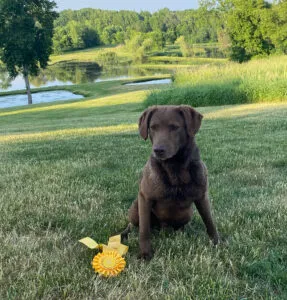 Chesapeake Bay Retriever male hunting dog CK's Grim Reaper MH-QAA, a powerful gundog
Chesapeake Bay Retriever male hunting dog CK's Grim Reaper MH-QAA, a powerful gundog
OFA: Good Elbows: Normal Cerf: Clear PRA: Clear by parentage EIC: Clear DM: N/N normal
Rip is the epitome of the total package, the vision we held when establishing our breeding program over two decades ago. He boasts striking looks, an impressive pedigree, and exceptional talent. Rip achieved his Master Hunter (MH) title with minimal training and further distinguished himself by earning Qualified All-Age (QAA) status, notably placing 2nd out of 25 dogs in an all-breed qualification. A delight to train, Rip responds well to correction and is an absolute rocket on blinds and marks. Beyond his competitive prowess, Rip is an outstanding gundog, actively hunting waterfowl for over 30 days a year and excelling as a pheasant dog. Frozen and live cover options are available for this superb sire.
Artic Surf Breaker
(Bonnema’s Wild Card QA2 X CK’s Bet on Decks MH-QAA)
 Athletic Artic Surf Breaker, a male Chesapeake Bay Retriever bred for hunting
Athletic Artic Surf Breaker, a male Chesapeake Bay Retriever bred for hunting
OFA: Elbows: Cerf: PRA: EIC: DM: (Information incomplete in original)
Miles is a handsome, powerful Chesapeake Bay Retriever exuding a fantastic personality. He holds qual ribbons and is anticipated to complete his Master Hunter (MH) title in 2024, demonstrating his steady progress and natural talent in the field.
Introducing Our Outstanding Chesapeake Bay Retriever Dams
CK’s Backwards Thinking SH
(CK’s Backwater Brody X CK’s Pay Piper MH-QAA)
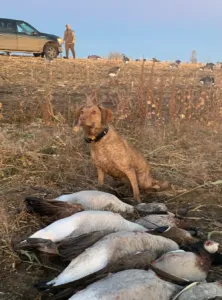 High-energy female Chesapeake Bay Retriever, CK's Backwards Thinking SH, ready for uplands
High-energy female Chesapeake Bay Retriever, CK's Backwards Thinking SH, ready for uplands
OFA: Good Elbows: Normal Cerf: Clear PRA: Clear by parentage EIC: Clear by parentage DM: N/N by parentage
KC is a high-energy, compact, and stylish female with a distinctive pedigree. She excels equally whether working in the uplands or navigating the marsh, making her a versatile and valuable gundog.
CK’s East Dakota
(K-City Jake QA2 x CK’s Pay Piper MH-QAA)
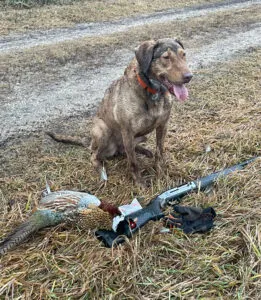 Talented female Chesapeake Bay Retriever, CK's East Dakota, displaying a great disposition
Talented female Chesapeake Bay Retriever, CK's East Dakota, displaying a great disposition
OFA: Good Elbows: Normal Cerf: Clear PRA: EIC: DM: (Information incomplete in original)
Dakota is a talented, athletic female Chesapeake Bay Retriever known for her exceptional disposition. She is currently working towards earning her Senior Hunter (SH) title, showcasing her strong potential.
CK’s Running Wild
(Bonnema’s Wild Card QA2 x CK’s Pistol Annie)
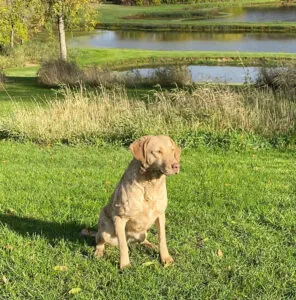 Sweet and working female Chesapeake Bay Retriever, CK's Running Wild
Sweet and working female Chesapeake Bay Retriever, CK's Running Wild
OFA: Elbows: Cerf: PRA: EIC: DM: (Information incomplete in original)
River is a remarkably sweet girl with a wonderful personality. She is actively progressing towards her Senior Hunter (SH) title, combining her charming nature with a strong work ethic.
CK’s Hawk of Montauk MH-QA2 Retired
(Bur Oak’s Unique Trapper** X Montauk’s Speed of Sound JH)
DOB: 12/10/08 OFA: Hip Cerf: CB-6441/2010 normal PRA: A-1 #10-5506 clear DM: N/N CB-DM267/0F-NOPI EIC: Clear Weight: 55 pounds
 Retired champion Chesapeake Bay Retriever dam, CK's Hawk of Montauk MH-QA2, proven producer of gundogs
Retired champion Chesapeake Bay Retriever dam, CK's Hawk of Montauk MH-QA2, proven producer of gundogs
Hawk, a 55-pound stylish and athletic female, stands out as one of the most trainable dogs we’ve ever worked with. She is an exceptional marker and a true team player, excelling with phenomenal blinds. Before her second birthday, she had already achieved a Derby 4th, a Qual Reserve Jam, and three Master Hunter passes. Hawk earned her MH title at just 2.5 years old and became Qualified All-Age (QAA) at three, winning a 29-dog all-breed qualifying stake. She placed in four of her last seven qualifying entries and continued to run All-Age Open stakes, securing an Open 2nd and multiple Open jams. Beyond her superb field capabilities, Hawk is the sweetest, most laid-back house dog imaginable. She is an excellent mother and a proven producer of talented field dogs, embodying the ideal Chesapeake Bay Retriever for hunting and family life.
CK’s Pay Piper MH*** Retired
(Tobacco Root Cub SH x CK’s Hawk of Montauk MH-QA2)
DOB: 1-25-11
OFA: Good CB-10160G24F-PI Elbows: Normal Cerf: CB-371343 DM: Clear N/N CB-DM1037/1F-NOPI PRA: Clear by Parentage EIC: Clear by Parentage
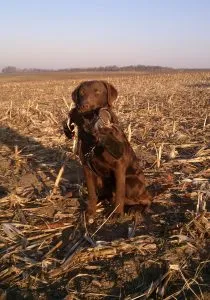 CK's Pay Piper MH, a retired Chesapeake Bay Retriever dam with excellent looks and field talent
CK's Pay Piper MH, a retired Chesapeake Bay Retriever dam with excellent looks and field talent
Piper is a direct result of our distinguished Chesapeake breeding program. She is not only incredibly talented but also possesses remarkable looks. A hard-running, excellent-marking, and super animated retriever, Piper is a joy to observe in action. She achieved her first AKC Master Hunter pass at the tender age of 16 months and earned her title at 2.3 years, passing five straight tests. Piper became Qualified All-Age with an Open Jam. As a proven gundog and mother, she has consistently produced good-looking, talented field dogs, reflecting the high standards of our program.
CK’s Bet on Decks MH*** Retired
(DC AFC Gamblers Dilwyn-Stacked Deck MH x CK’s Hawk of Montauk MH-QA2)
OFA: Excellent Elbows: Normal Cerf: Normal PRA: Clear EIC: Clear DM: A/N
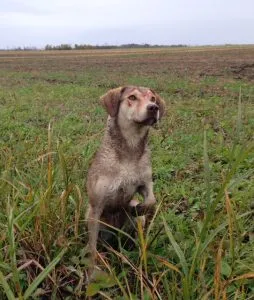 Youngest Master Hunter Chesapeake Bay Retriever, CK's Bet on Decks MH, a super talented family and hunting dog
Youngest Master Hunter Chesapeake Bay Retriever, CK's Bet on Decks MH, a super talented family and hunting dog
Betsy has lived up to her impressive pedigree, making history as one of the youngest Chessies to achieve both a Master Hunter title (at 2.1 years) and Qualified All-Age (QAA) status (at 2.3 years). She is exceptionally talented and a true pleasure to be around and train. Betsy has also demonstrated her versatility as an excellent family dog and a capable hunting companion, in addition to being a superb mother, contributing significantly to our lineage of top-tier Chesapeake Bay Retriever hunting dogs for sale.
Finding a Chesapeake Bay Retriever hunting dog for sale that perfectly matches your needs requires careful consideration of breeding philosophy, proven genetics, and comprehensive health clearances. Our program stands as a testament to these principles, consistently producing Chessies with exceptional drive, intelligence, and temperament, built for both challenging field work and loving home environments. We are committed to upholding the highest standards of the breed, ensuring that each puppy we offer has the potential to become an outstanding hunting partner and a beloved member of your family. Contact us to learn more about our current litters and discover the perfect addition to your hunting team or home.
